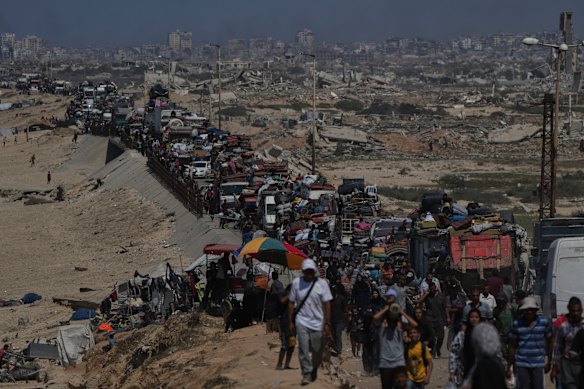
Israeli troops and tanks intensified their offensive in Gaza City on March 15, 2024, as a growing number of Palestinians fled the area amid escalating violence. The military operation has severely disrupted communication services, complicating efforts for those in need of medical assistance and evacuation.
The Israeli military reported that air force and artillery units conducted over 150 strikes on Gaza City in recent days, paving the way for ground forces to advance. These strikes targeted high-rise towers, which Israel claims were being utilized by Hamas for surveillance purposes. The resulting destruction has left many densely populated areas devastated and displaced.
As the military action unfolded, local health officials indicated that the Palestinian death toll in the ongoing conflict has surpassed 65,000, according to data from Gaza’s Health Ministry, which is affiliated with the Hamas-led government. Overnight airstrikes reportedly resulted in the deaths of at least 16 individuals, including women and children, highlighting the humanitarian crisis facing civilians caught in the conflict.
Communication Blackout Complicates Rescue Efforts
The bombardment has also led to widespread outages of phone and internet services. Regulators noted that this disruption complicates the ability of Palestinians to coordinate evacuations, summon ambulances, or share information about the military’s actions. The ongoing offensive began earlier in the week, with the objective of establishing full control over Gaza City.
Displaced individuals have been fleeing Gaza City, moving along the coastal road towards southern Gaza as they seek refuge from the violence. The situation remains dire as humanitarian organizations struggle to provide aid amidst the chaos.
Controversial Remarks from Israeli Officials
In a separate development, Bezalel Smotrich, Israel’s far-right finance minister, made headlines with remarks suggesting that Gaza could be viewed as a potential “real estate bonanza.” Speaking at an urban renewal conference in Tel Aviv, he mentioned discussions with the Trump administration about a plan to share profits from future land development in Gaza.
Smotrich stated, “We paid a lot of money for this war, so we need to divide how we make a percentage on the land marketing later in Gaza.” He characterized the current phase of destruction as the initial step in a broader plan for urban renewal, emphasizing the need to rebuild the area following the military intervention.
These statements have ignited controversy, particularly given the severe humanitarian impact of the ongoing conflict. As the situation in Gaza continues to evolve, the international community closely monitors the developments, urging for a resolution that prioritizes civilian safety and humanitarian assistance.






